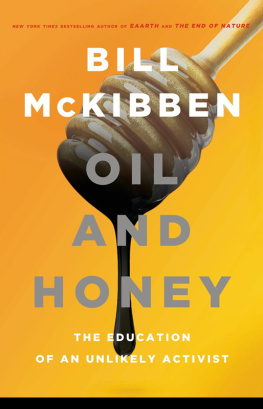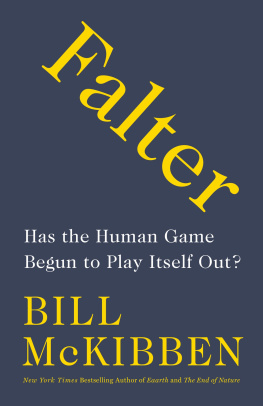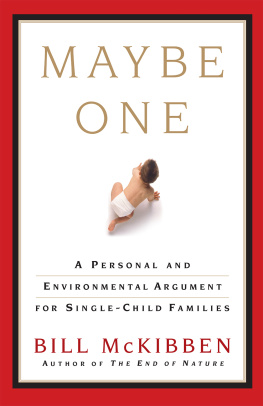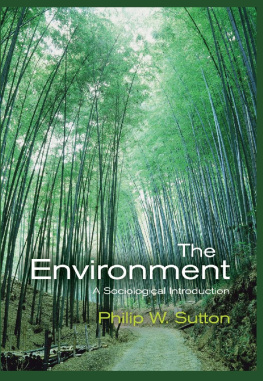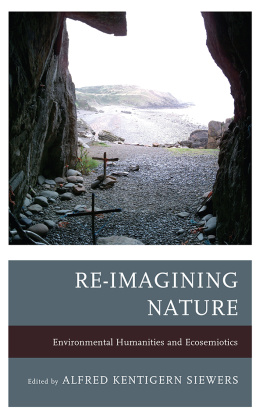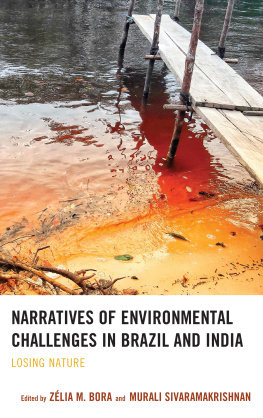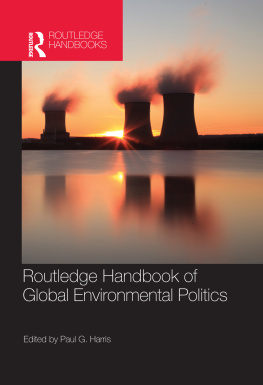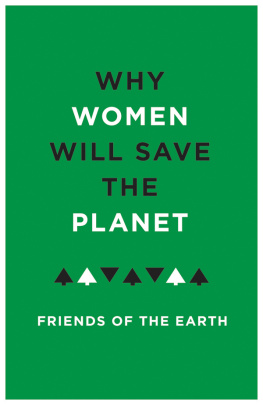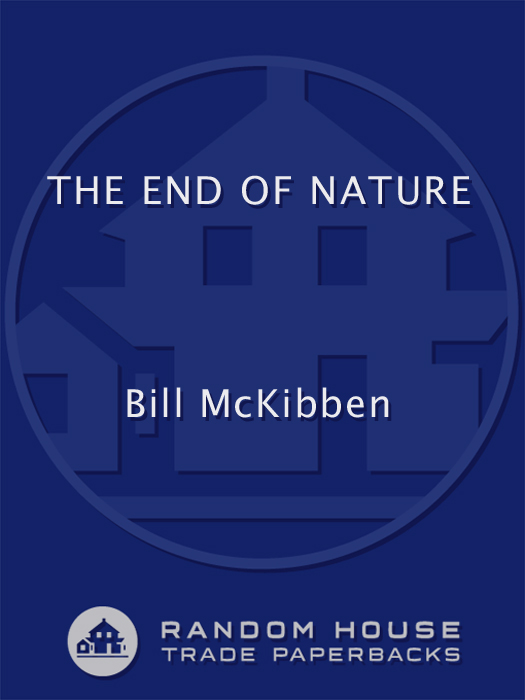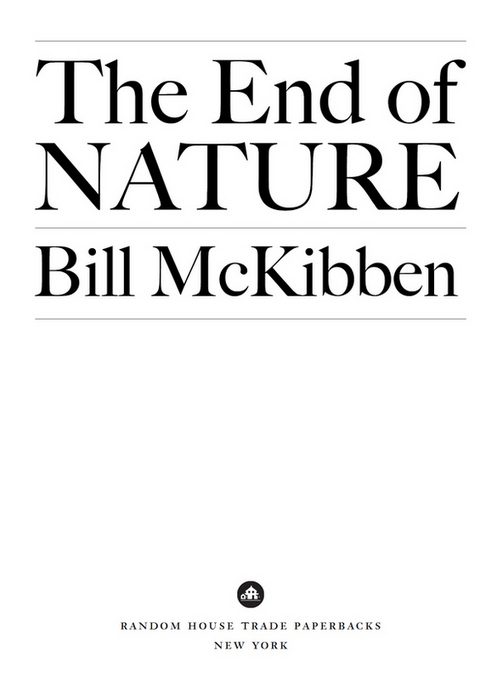PRAISE FOR The End of Nature
Whatever we once thought Nature waswildness, God, a simple place free from human thumbprints, or an intricate machinery sustaining life on Earthwe have now given it a kick that will change it forever. Humanity has stepped across a threshold. In his free-ranging and provocative book, Bill McKibben explores the philosophies and technologies that have brought us here, and he shows how final a crossing we have made.
J AMES G LEICK , author of Chaos
By the end of nature Mr. McKibben means the end of nature as a force independent of man. For a man preaching apocalypse, he speaks in a measured and civilized voice that deserves a hearing.
The New York Times Book Review
The End of Nature is not another doomsday book. McKibben does not forecast the end of man but the end of a primal relationship. It is almost impossible for a reader to walk away from this book and not reassess his relationship with a world where rapid growth and smog make it harder each night to see the stars.
Daily News (Los Angeles)
[The End of Nature] will probably become the critical text for intelligent environmentalism in the next decade.
The Independent (London)
Like Aldo Leopold, Rachel Carson and Jonathan Schell, McKibben belongs to that rare breed of writer who will take an honest look at what we have done to the earth. The End of Nature is his brave attempt to record some of the consequences of our folly.
Albuquerque Sunday Journal
This is a thoughtful book by a fine writer.
San Francisco Examiner
A dark and unsettling account of the abuse weve done to our environment and of the unprecedented effectsboth physical and philosophicalit is going to have on our future.
Vanity Fair
You must read The End of Nature. You mustnt be happy about it, but please read it. It is a great and terrible work, like few that have been written.
R CK B ASS , author of Oil Notes
Once into this deceptively slim and readable volume, the indisputable power and inevitability of the message takes over. McKibbens book is especially valuable because it explains what is likely to be the major environmental issue of the twenty-first century in clear and very thoughtful fashion.
Christian Science Monitor
Bill McKibben has written a graceful, witty and tragic essay about the consequences of global warming caused by the greenhouse effect.
Los Angeles Times
[McKibben] may well already have taken his place next to Rachel Carson and Silent Spring.
Baltimore Evening Sun
The End of Nature will provoke some deep thinking in all who read it, and may prove to be the ultimate in green books.
Belfast Times
For anyone interested in knowing what it will be like to live in a greenhouse world, may I recommend Bill McKibbens recently published book The End of Nature? While unsettling to read, it is too gripping to lay down.
The Dallas Morning News
This is just the tocsin weve been waiting forangry, eloquent, manifoldly knowledgeable. Let it ring and ring and ring. Let it Klaxon for that matter. Let it cause a hell of a stir.
E DWARD H OAGLAND
2006 Random House Trade Paperback Edition
Copyright 1989, 2006 by William McKibben
All rights reserved.
Published in the United States by Random House Trade Paperbacks, an imprint of The Random House Publishing Group, a division of Random House, Inc., New York.
R NDOM H OUSE T RADE P APERBACKS and colophon are trademarks of Random House, Inc.
Originally published in hardcover in the United States by Random House, an imprint of The Random House Publishing Group, a division of Random House, Inc., in 1989. First published in paperback in the United States by Anchor, a division of Random House, Inc., in 1999.
Portions of this book originally appeared in The New Yorker as Reflections: The End of Nature.
Grateful acknowledgment is made to Random House, Inc., for permission to reprint an excerpt from the poem Apology for Bad Dreams by Robinson Jeffers from The Selected Poetry of Robinson Jeffers. Copyright 1925 and renewed 1953 by Robinson Jeffers. Reprinted by permission of Random House, Inc.
LIBRARY OF CONGRESS CATALOGING-IN-PUBLICATION DATA
McKibben, Bill.
The end of nature / Bill McKibben.
p. cm.
ISBN 0-8129-7608-8
eBook ISBN: 978-0-8041-5344-7
I. ManInfluence on nature. 2. Greenhouse effect, Atmospheric. 3. Environmental protection. I. Title.
[GF75.M38 1990]
304.28dc20 90-34480
www.atrandom.com
v3.1
Contents
Introduction
I WRITE THIS INTRODUCTION in late fall of 2005 thinking back seventeen years to 1988 when, as a young man, I was hard at work on The End of Nature. It was the first book for a general audience about global warming; there were details then that no one yet knew. Butsadlythe story has played out as I expected at the time. By now, everyone knows more or less whats going on. Still, its astounding to watch how deep and relentless the change has been. On this morning, for instance, Hurricane Wilma, the record-setting twenty-first named storm of the year, bears down on the Gulf of Mexico. The pressure in its center this morning was the lowest ever recorded in the Atlantic. It follows by a few weeks the unmatched destruction of Katrinaand by a few more weeks a paper in Nature demonstrating that on average hurricanes now last 60 percent longer and have peak winds 50 percent greater than a generation earlier.
Meanwhile, here are a few of the other developments on planet Earth in the last ten weeks:
The scientists tracking Arctic sea ice reported that for the fourth year in a row it was diminishing, and at an accelerating pacean area twice the size of Texas had vanished. As that melt progressed, it triggered its own feedback effect: instead of white ice to bounce the suns rays back out to space, blue water now absorbed that solar energy, amplifying the process. We may have reached a tipping point, one researcher said.
A British team released a new study of soils, showing that as the planet has warmed and the period between frosts lengthened (winter is now eleven days shorter on average than in 1970), microbial activity in the top layers of the ground is increasing. This decay is in turn releasing carbon stored in the soil, again amplifying the greenhouse effect. And not by a trivial amount: The thirteen million tons of carbon released annually in the British Isles is enough to completely offset all the fairly ambitious work the British have done to change their energy practices in the last two decades.
Similarly, researchers in Russias far north recently released data showing that the permafrost beneath the tundra is melting at record rates, and in the process releasing quantities of methane, another potent greenhouse gas. In fact, last winter so much methane was suddenly perking out to the surface that in places the bubbling kept open water from freezing.
In the late 1980s, we didnt completely understand the sensitivity of the earths physical systems to small shifts in temperature. Most of the scientists I talked to then would not have predicted that a 1-degree rise in global average temperaturewhich is what we have so far causedwould be enough to so thoroughly disrupt the planet. But it has. The world is a different placemore chaotic, storm tossed, disease ridden. Heres one way of saying it: in 1968, when I was a boy, Apollo 8 sent back the first pictures of our planet, that blue-white marble floating in space. Well, those pictures are as out of date as my high school yearbook photo. The planet doesnt look like that or behave like that anymoretheres more blue and less white, more cyclones swirling in the tropics. Its a different Earth; we might as well hold a contest to pick a new name.


